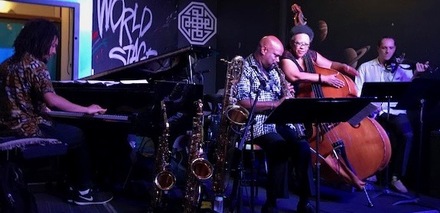A promise of Monk AND Mingus -- that's enough to send us scrambling if the players have credentials, and veteran bassist-singer Nedra Wheeler's passport is stamped every whichway. Plus, what a band! But we'll get to that.
Leimert Park's World Stage has grown even more welcoming now that the entrance has moved 'round back, with patio chairs for between-set lounging, Afro-capped mega-singer Dwight Trible (who books most of the shows) greeting all & sundry, and colorful art painted on the walls. Have a cookie.
The welcome also extends from the stage, Wheeler exuding easy charm as Dale Fielder heaves up his baritone sax and bumps into the bopsoul riff of Mingus' "Moanin'." Drummer Thomas White, the least familiar face, shows how to lag & drive at the same time, a feel that can't be taught, and Mingus' drummer Dannie Richmond sure didn't get it by scrutinizing charts. Wheeler herself does justice to Mingus without copping his standup-bass technique -- he was more of a blackjack bully; she's a lowriding groove churner.
The first set's Monk selection is "Bye-Ya," a cute stop-rhythm classic that Wheeler says she wants to enhance with a touch of Snoop Dogg (!), and damned if the band don't pull it off, with Wheeler dropping dual-exhaust accents while Fielder cuts a clean bop solo on alto.
But Wheeler's program title also promised "more," and that's where expectations get super-surpassed. Wheeler's Ghanaian-influenced "Desert Song" drifts on a magical wind, enhanced by her wailing, wordless voice and the keening violin of tall & angular Miguel Atwood-Ferguson, who brings concentrated energy and vast musical knowledge to every song and every style. Another very appropriate treat is the lovely and unindebted ballad "As a Child" by the late Horace Tapscott, a multi-decade World Stage performer and mentor. Here we most clearly spy the special eye-to-eye and ear-to-ear connection between Wheeler (a distinguished Tapscott alumna) and pianist Jamael Dean, breaking his stoic demeanor with a faint smile as he negotiates Tapscott's winding changes. Here it is again, a master's legacy, which lies not in imitation but in the confidence to carve out individual artistry. Young Dean does it with a wide variety of key pressures, a spontaneous sensitivity and a spare harmonic sophistication -- worlds away from the tumultuous Tapscott, whose music he nevertheless approaches with pure love. When the wider jazz world hears Dean, he'll be working like a dogg.
Wheeler wraps up the set with Cole Porter's "Every Time We Say Goodbye" and someone's '40s-like "Someone Like You," both of which she sings with enough breathy intimacy to make us want to cry. But we're a little too happy for that.
* * *
PHOTOS BY FUZZY BOGG.

